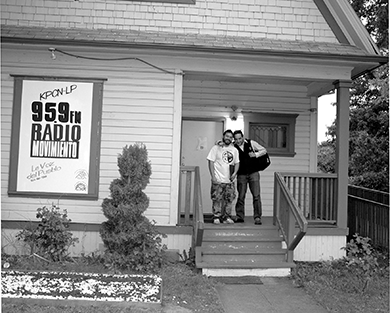Assessing Community Leaders’ Views on Immigrant-Community Relations
Increased diversity resulting from immigration prompts a community conversation in the Eugene-Springfield area
a study by Bob Bussel (Labor Education and Research Center, LERC), Marcela Mendoza (Centro LatinoAmericano), Edward Olivos (Education Studies), and Daniel Tichenor

Over the last two decades, Lane County has experienced double-digit growth in its foreign-born population, with Latinos comprising nearly 6.5 percent of Lane County’s total population, 10.1 percent of Springfield’s residents, and 6.7 percent of Eugene’s population. In order for the communities of Eugene and Springfield to realize their potential in the 21st century, they will need to help their increasingly diverse populations become more socially, civically, and economically integrated. With this goal in mind, the University of Oregon’s Labor Education and Research Center (LERC) hosted a “Community Conversation on Immigrant Integration” in Springfield on November 19, 2010, led by LERC director Bob Bussel and assisted by Marcela Mendoza, executive director of Centro Latino Americano; Edward M. Olivos, department head and associate professor in the UO Department of Education Studies; and Daniel Tichenor, professor of political science and senior fellow at the UO Wayne Morse Center for Law and Politics.
This conversation—funded by Oregon Humanities—involved nearly 28 key stakeholders (clergy, business and labor leaders, elected officials, immigrant advocates, nonprofit and social service agency providers, and educators) who serve immigrant populations or have a role in shaping public policies relevant to immigrants. This conversation had several principal objectives: enabling participants to evaluate how successful their own organizations or institutions have been in helping immigrants achieve social and economic integration; informing participants about best practices in the arena of immigrant integration; and encouraging them to consider which practices might be applicable in their organizational or community settings. The event concluded with participants identifying specific areas for collaborative work on immigrant integration that will be explored more thoroughly at a subsequent meeting.
Interviews Supported by CLLAS
Prior to the event, LERC director Bob Bussel, with input from his collaborators, conducted 22 interviews with a diverse group of people in Eugene and Springfield who work closely with immigrants in their communities. The Center for Latino/a and Latin American Studies (CLLAS) provided support for these interviews, which played an important role in helping shape the community conversation. The interviewees represented such institutions as law enforcement, churches, libraries, city government, businesses, schools, nonprofits, unions, and community organizations. Bussel asked the community leaders to assess the status of community-immigrant relations and evaluate the extent of immigrant integration efforts in their institutions. The data obtained from these interviews yielded many valuable insights and illuminated how key stakeholders and activists view their responsibilities and obligations to Lane County’s foreign-born population.
The interviews revealed many ongoing community initiatives aimed at aiding immigrant integration. These included outreach activities by law enforcement, library programs aimed at immigrant children, support for immigrant businesses, school-based efforts to assist immigrant children and their families, and initiatives to help immigrants learn about credit, banking, and home ownership. Respondents also identified specific challenges impeding immigrant integration, among them cultural and linguistic barriers, fear and reluctance among immigrants to engage with existing institutions, uncertainty among some institutions about how to conduct effective outreach to immigrants, and eligibility to receive public services due to lack of legal status. At the conclusion of the interviews, community leaders were asked to identify resources and actions that they believed would be especially helpful in promoting immigrant integration. Among the ideas they suggested were greater access to legal assistance, improved access to counseling and mental health services, the recruiting of more bilingual and bicultural staff for key institutions, passage of the Dream Act to help immigrants attend college, creating a Spanish language radio station as an effective means of outreach, and greater coordination among groups that work with immigrants.
In addition to generating a wealth of useful insights, the interviews helped attract a strong turnout for the community conversation and have laid the foundation for closer collaboration between UO scholars, immigrants in Eugene and Springfield, and key persons and institutions who work closely with immigrants and their families. Although immigrants and the native-born may, as one interviewee described, often function in “parallel universes,” the community conversation suggests the possibility for enhanced coordination and partnering that can make Eugene and Springfield more welcoming environments for our newest arrivals.
— by Bob Bussel, director of the UO Labor Education and Research Center and associate professor, Department of History
